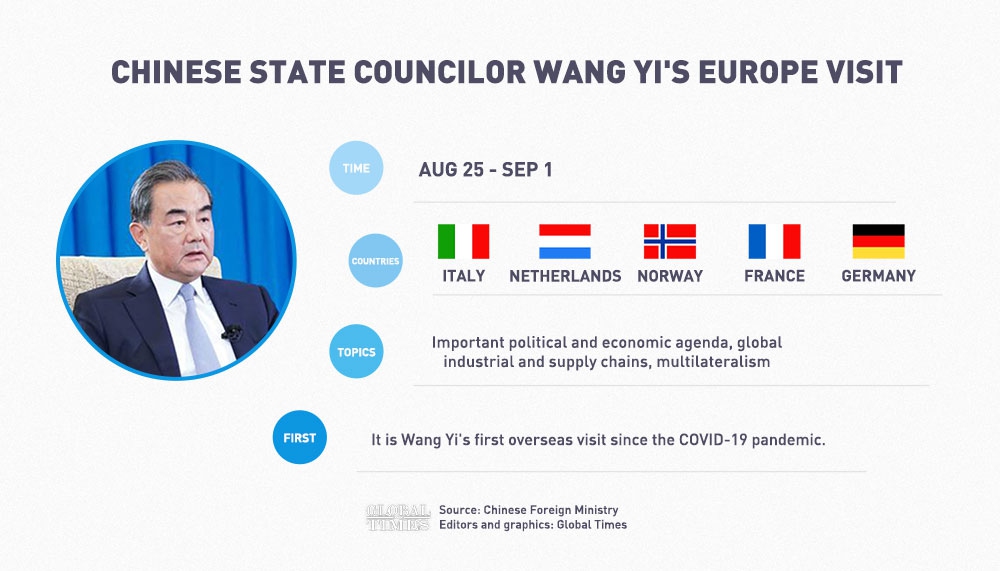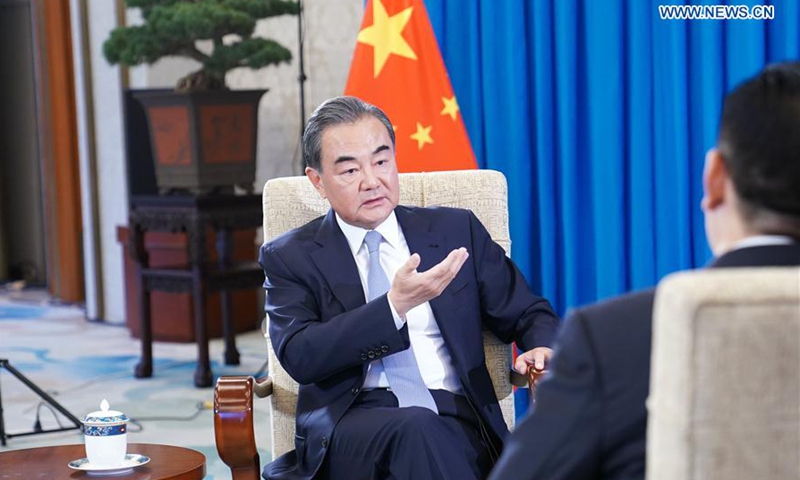Chinese FM's Norway visit sees advancing FTA, aquatic products trade
By GT staff reporters Source: Global Times Published: 2020/8/26 21:56:46
Noise will not affect FM’s visit, decision-making of countries

Wang Yi Europe visit
Chinese State Councilor and Foreign Minister Wang Yi's scheduled visit to the Netherlands and Norway will see exchanges gradually resume amid the COVID-19 pandemic and strengthen political mutual trust, and particularly his trip to Norway shows that China's relations with Northern Europe will be significantly improved, Chinese analysts said.
During his visit to Norway, Wang will meet Norway's prime minister and foreign minister, and China would like to push for greater development of China-Norway relations in the new era, and expects the visit to inject new impetus into China-Norway cooperation in various fields, especially the China-Norway free trade agreement (FTA), Zhao Lijian, a spokesperson of the Chinese Foreign Ministry, said at Wednesday's media briefing.
Norway was one of the first European countries to recognize the People's Republic of China, and also one of the first European countries to acknowledge China's market economy status.
Norwegian Ministry of Foreign Affairs told the Global Times on Wednesday that Wang will arrive in Norway on Thursday, and this visit provides a good opportunity to strengthen China-Norway relations.
Response to COVID-19 pandemic, the work of Security Council, FTA negotiations, cooperation on oceans and climate change will be important topics, the Norwegian Ministry of Foreign Affairs said.
Norway was the only Northern European country during Wang's Europe trip, which includes Italy, the Netherlands, Germany and France.
Wang Yiwei, director of the institute of international affairs at Renmin University of China in Beijing, told the Global Times that Wang is among the highest-ranking Chinese officials to visit Norway in recent years, after the Norwegian Nobel Committee's decision in 2010 to grant the peace prize to Liu Xiaobo, a Chinese convict who was sentenced to 11 years in jail in 2009 for subversion of state power and died of multiple organ failure due to liver cancer in 2017, that soured bilateral relations. The two countries normalized their bilateral ties in 2016.
Wang's visit is a sign of improving relations between China and Norway, China and Northern Europe.

Chinese State Councilor and Foreign Minister Wang Yi gives an exclusive interview to Xinhua on China-US ties in Beijing, capital of China, Aug. 5, 2020. (Xinhua/Zhai Jianlan)
As China's relations with Sweden have deteriorated in recent years, the improvement in relations with Norway is conducive to China's relations with Northern Europe, Wang said.
Northern European countries less affected by US pressure managed to maintain relatively independent foreign policies. And the first Chinese free trade agreement China signed with a European country was signed with Iceland, Chen Fengying, a research fellow at the China Institute of Contemporary International Relations in Beijing, told the Global Times. Iceland signed an FTA with China in 2013.
China is negotiating with Norway on the China-Norway FTA, and the two sides finished the 16th round of negotiations in November last year. China's Ministry of Commerce said both sides had made progress in negotiations.
Since Norway is one of China's main suppliers of aquatic products, the aquatic products trade is also expected to grow in the future.
Victoria Braathen, director for Chinese mainland and Hong Kong at the Norwegian Seafood Council, told the Global Times on Wednesday that they see China as a great potential market, and the Norwegian seafood industry expects to further develop the Chinese market.
Although trade declined due to the COVID-19, Braathen said she believes consumers will gradually feel confident and safe about the products.
Before his Norway visit, Wang is expected to visit the Netherlands.
While the Netherlands is one of the founding members of the EU and has a great say in the EU, China-Netherlands ties are a crucial part of China-Europe relations, Cui Hongjian, director of the Department of European Studies at China Institute of International Studies, told the Global Times.
China and the Netherlands have launched a number of China-Europe freight trains, and nearly half of China's deepwater cargo ships bound for Europe dock at Rotterdam. Strengthened China-Netherlands relations will help promote multilateralism, free trade and maintain the international trade system and stability in the world, analysts said.
The Netherlands is China's second-largest trade partner in the EU, and Chinese companies, including Huawei, have cooperative projects with the Dutch. The University of Amsterdam said it set up a joint program with Huawei in 2014, offering Dutch students to visit China and enroll in a training program at Huawei in Shenzhen. This year, the program was pushed online due to the COVID-19 pandemic.
During a telephone conversation with his Dutch counterpart Stef Blok in June, Chinese Foreign Minister Wang Yi said China is willing to continue working with the Netherlands to coordinate their efforts in pushing forward epidemic prevention and control on a regular basis, and promoting bilateral exchanges and cooperation to chart a new course for bilateral ties.
The two sides can strengthen communication on launching fast channels, gradually resume exchanges of necessary personnel, and jointly maintain the stability of industrial and supply chains, Wang said.
During Wang's five-nation visit that started from Italy, Hong Kong secessionist Nathan Law Kwun-chung urged the Italian foreign minister to take a hard-line stance over Hong Kong affairs, and a Dutch parliament member plans to meet Wang to raise Hong Kong and Xinjiang issues.
Despite this, Italian Foreign Minister Luigi Di Maio said on Tuesday that Italy and China need to forge closer ties.
Such noise is aimed at creating confusion and disturbing the visit, but will not affect these countries' policies or cooperation with China, Li Haidong, a professor at China Foreign Affairs University, told the Global Times.
Leaders of these countries will decide based on their countries' interests, rather than on those with ulterior motives, Li said.
RELATED ARTICLES:
Posted in: DIPLOMACY